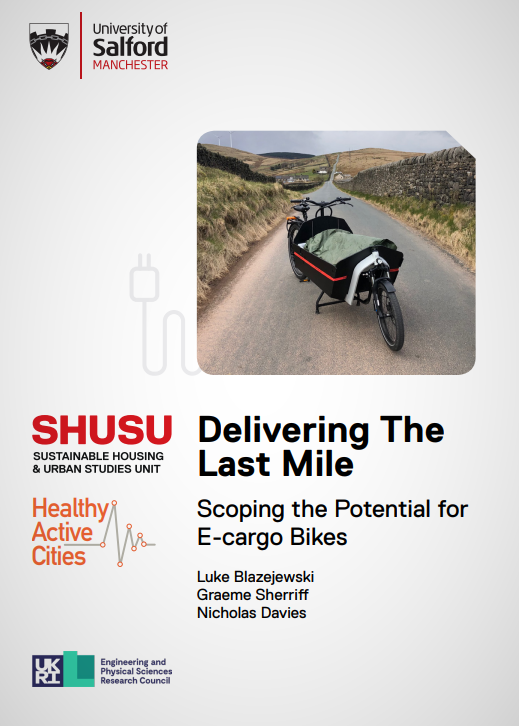
Delivering the last mile: Scoping the potential for e-cargo bikes
Authors: Luke Blazejewski, Nicholas Davies and Graeme Sherriff (2020)
PDF (31 pages, 3.5 MB)
E-cargo bikes are an emerging technology with a low carbon footprint and lower running costs when compared with vans. They demonstrate increased potential to avoid contributing to, and being delayed by, traffic congestion. In comparison to conventional bikes, the combination of an electric-assist motor and larger frame offers the capacity to carry bulkier and heavier objects over longer distances. There is scope for businesses to use the vehicles for local deliveries and for the bikes to be used in connection with distribution hubs to provide a sustainable last mile.
Key Findings
E-cargo bikes have potential
Businesses see value in the vehicles not only because, when compared with vans, they contribute to a smaller carbon footprint and a greener company image, but also in relation to practical benefits. In comparison with conventional bicycles, the larger frame and electrical assistance offer a way to carry relatively large loads without high levels of fitness. In comparison with electric vans, our participants recognised that the bikes offer lower running costs and can reduce congestion. There are opportunities to integrate e-cargo bikes into delivery practices in order to capitalise on their potential for last mile deliveries in the context of freight.
Barriers to using e-cargo bikes are shared with conventional cycling
However, e-cargo bikes also have their own barriers. Electrically assisted bikes help to overcome barriers relating to fitness levels and carrying heavy loads, but e-cargo bikes introduce their own challenges. The potential barriers identified by our participants include the initial capital cost, storage, charging and manoeuvring in traffic, as well as understanding the long-term maintenance of the bikes.
E-cargo bikes are more than just technology
They do not reflect a straightforward substitution in technology. In order to scale up, there is a need for business practices to adapt, new technologies to be adopted and delivery patterns to be changed to inspire long-term decarbonisation. Delivery operatives must also have skills in cycling.
Support for businesses is vital
Not only will businesses compare the initial capital outlay associated with a bike with the cost of a van – for which there is a more developed second-hand market – they will also consider the risks of training staff and rethinking delivery practices. Opportunities to try the bikes, and support for businesses to understand their running costs and how they can adapt their practices to accommodate the bikes should therefore be policy priorities.
Technology is key
Rider tracking and online shops improve efficiency and help to make the bikes a realistic consideration for businesses. Education and awareness raising are needed Awareness of e-cargo bikes and their potential remains low. More trial schemes and e-cargo bike libraries are needed for people to understand their potential and how they might use them.
Research can aid the transition
A clearer understanding of the potential emissions reduction from e-cargo bike adoption, the approaches that businesses can take to adapt their practices to benefit from the technology, and the ways in which cities can configure infrastructure and road space to better accommodate the vehicles, will provide a provide a valuable evidence base for a transition to sustainable freight systems.
